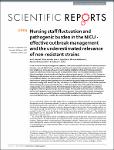Nursing staff fluctuation and pathogenic burden in the NICU - effective outbreak management and the underestimated relevance of non-resistant strains
Hensel, Kai O.
Bruck, Rhea van den
Klare, Ingo
Heldmann, Michael
Ghebremedhin, Beniam
Jenke, Andreas C.
In the course of a hospital management takeover, a microbial outbreak took place in a tertiary neonatal intensive care unit (NICU). Here, we characterize the outbreak and its management. About 4 months prior to takeover, there was a sharp increase in positive isolates for MSSA and multidrug-resistant organisms (MDROs). Simultaneously, the nursing staff sick leave rate increased dramatically which directly correlated with the number of infection/colonization per week (r2 = 0.95, p = 0.02). During the following months we observed several peaks in positive isolates of methicillin-sensitive staphylococcus aureus (MSSA), MDROs and subsequently a vancomycin-resistant enterococcus (VRE) outbreak. Interventional outbreak management measures were only successful after substantial recruitment of additional nursing staff. None of the VRE, but 44% (n = 4) of MDRO and 32% (n = 23) of MSSA colonized infants developed symptomatic infections (p = 0.02). Among the latter, 35% suffered from serious consequences such as osteomyelitis. The most important risk factors for colonization-to-infection progression were low gestational age and birth weight. Nursing staff fluctuation poses a substantial risk for both bacterial colonization and infection in neonates. Comprehensive outbreak management measures are only successful if adequate nursing staff is available. Non resistant strains account for most neonatal infections – possibly due to their limited perception as being harmful.
No license information

